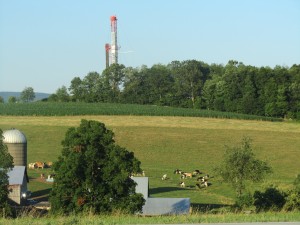Duke Researchers Push Back on DEP’s Critique
-
Susan Phillips
Authors of a controversial study on the impacts of gas drilling in Pennsylvania have called Department of Environmental Protection Secretary Michael Krancer to the mat on questions of bias. In an op-ed in Friday’s Inquirer, Robert Jackson and Avner Vengosh, defend their research against Krancer’s accusations of “suspect science.” They also challenged Krancer to share data.
Krancer recently testified in Congress about gas drilling, defending the state’s abilities to regulate the practice against unnecessary interference from federal regulators. Krancer also told Congress that the conclusion that fracking causes groundwater pollution is “bogus.” He brought up the Duke study, calling it “statistically and technically biased.” The Secretary points to a recent study by Penn State researchers, and funded by the Center for Rural Pennsylvania, whose findings appear to contradict the Duke study.
In fact, the Duke study did not find evidence that fracking itself causes water contamination. But it did find levels of methane were 17 times higher in drinking water wells near gas drilling sites. The study also found elevated levels of ethane and propane.
The Penn State study also found no evidence that fracking polluted water supplies. But unlike the Duke study, it did not find statistically significant levels of methane in water wells near natural gas well pads. Both studies acknowledged a small data set, and the need for more research.
In Friday’s op-ed the Duke researchers said Krancer’s accusations of bias surprised them.
“The Department of Environmental Protection’s stated mission is “to protect Pennsylvania’s air, land, and water from pollution and to provide for the health and safety of its citizens through a cleaner environment.” Wouldn’t that include taking the time to understand what scientific results like ours mean, where they might apply, and what should be done in response? Instead, Krancer quickly set out to, as he put it, “refute” our study and others.”
Duke researchers Vengosh and Jackson offered to exchange data with the DEP. Along with questions over funding and bias, scientists studying Marcellus Shale drilling say there’s also a lack of good data. We’ve contacted DEP to find out Krancer’s response to the Duke researchers’ request, and we’ll let you know his take on this, when we do.

















